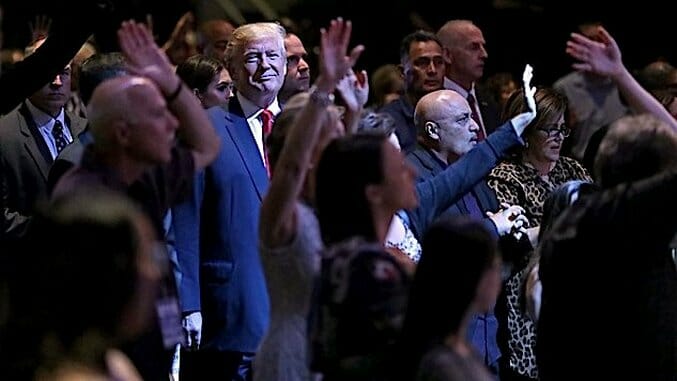Of Course Many Evangelicals Are Backing Trump—Their Beliefs Are Illogical and Contradictory
Photo by Chip Somodevilla/Getty
Even for Christopher Hitchens-quoting, Richard Dawkins-reading anti-theists, the irony of our current political situation must come off as too good to be true. At least until now, it sort of made sense. George W. Bush may have said that God told him to invade Iraq, but at least he came across as the sort of guy who’d actually believe it. That doesn’t seem like the case with the current GOP nominee.
Sure, a good chunk of evangelicals tend to ignore the more “liberal” parts of scripture, but never like this. Donald Trump is, according to James Dobson, a “baby Christian” and thus should receive forgiveness for his wrongdoing—past, present and future. After all, God can use anybody. As long as it’s not Hillary Rodham Clinton, of course.
The hypocrisy is a mystery to many, but it really shouldn’t be. I grew up with evangelicals, I went to school with them, and I was taught by them. It comes as absolutely no surprise to me that they’re eating up everything Trump represents by his platform and candidacy.
What seems to be perplexing most people is how the “moral majority” could fall so readily into the arms of a someone who has been married three times and brags about his infidelity…not to mention his sexual abuse. He’s made fun of the disabled and disparaged the sojourner and immigrant. He is the most blatant threat to religious liberty in recent memory, but it doesn’t matter since his ire focuses on Islam rather than Christianity. It may be more difficult for a camel to pass through the eye of a needle than for a rich man to enter the kingdom of heaven, but the same logic does not apply to the Oval Office.
There are memes aplenty pointing out how these same people would never let Barack Obama live it down if he’d done half the things Trump has. It’s true: they wouldn’t. But it’s not for the reason they think. The evangelical problem with the left isn’t primarily that it’s ethically off-base, or that it represents a system of morality that’s of less empirical or rational value than theirs. It’s that the left is disobedient. For a good chunk of Christian voters, morality is as objective as the color of the sky or the fact that you need to breathe oxygen to survive.
This is the reason why, even if Clinton boldly proclaimed herself as a devout Christian, she still wouldn’t get off the hook. She’d need to become obedient. Given Clinton’s sex, her very presumption of entering a competitive race for authority is inherently disobedient. Her insistence women should retain autonomous control over their bodies even more so.
To espouse the doctrines of the left is to be a heretic. As with most heresy, it’s easy for the outside observer to see why it cropped up in the first place. Despite centuries upon centuries of orthodoxy, the Bible, as a source text, remains difficult to interpret and justifies differences in hermeneutical conclusions. For the most part, I respect the orthodox conclusions of evangelical theology. They make sense given the source text; they’re logical based on what they’re working with. When it comes to evangelical conclusions about political orthodoxy, I can’t say the same.
If evangelicals want to reduce the size of government, they must argue with Paul about whether Christians should rebel against government at all. If they want to try to influence government with levitical commands against homosexuality, they must ask themselves why they aren’t similarly trying to influence it to legislate morality when it comes to charitable giving. If they want the redistribution of wealth to be considered anathema, they must disagree with both Old and NewTestaments. If they believe that God created the heavens and the earth, they must answer why they don’t want to protect it. If they want to cry out for the rights of the unborn, they must be able to answer YHWH’s admonitions and Christ’s questions about why they tried to keep the refugee, the immigrant or the disadvantaged from assistance.
-

-

-

-

-

-

-

-

-

-

-

-

-

-

-

-

-

-

-

-

-

-

-

-

-

-

-

-

-

-

-

-

-

-

-

-

-

-

-

-








































